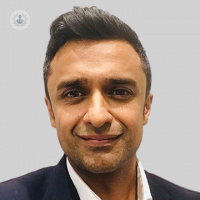Why am I having an ERCP?
Written in association with:You may have recently been troubled by symptoms of abdominal pain or discomfort, weight loss or jaundice which prompted your doctor to recommend an endoscopic retrograde cholangiopancreatography (ERCP). Dr Deepak Joshi, a hepatologist from South London explains why you have to undergo this procedure and what it precisely involves.

What is an ERCP used for?
An ERCP is an endoscopic (flexible camera) procedure to treat problems of the gallbladder, biliary system, pancreas and liver. It is performed using a special endoscope called a duodenoscope which examines where digestive fluid comes (such as the liver, gallbladder and pancreas) to where it enters the intestines. Contrast agents with X-rays also are used in conjunction with the endoscope to visualise the bile ducts or the pancreatic duct better.
Why would I need this procedure?
Before an ERCP is undertaken, you will have had either an ultrasound scan, a CT scan or an MRI. Blood tests are also performed including a full blood count (FBC), clotting (INR), kidney function tests (U&Es) and liver blood tests (LBTs). If any of these tests confirm there is something abnormal occurring in the bile or pancreatic ducts or there is a mass present, then an ERCP is carried out. Some of the common reasons to have an ERCP include:
- To remove a stone in the bile duct or the pancreatic duct.
- To investigate and treat a blockage in the bile duct or pancreatic duct caused by a stone, narrowing of the bile/pancreatic duct or growths (cancer or non-cancerous).
- To treat a leak from the bile duct.
What does an ERCP involve?
You will need to stop eating and drinking for six hours before the procedure. ERCP is performed under sedation but some centres use general anaesthetic which makes it more comfortable for you.
During the procedure, you will be positioned on your front with your head to the side. Once you are sedated, the endoscope is passed beyond the stomach and into the small bowel (duodenum) where the bile ducts drain out. The opening is called the major papilla or the ampulla of Vater. Using an X-ray, the bile or pancreatic ducts can then be visualised. We also check your blood pressure, heart rate and oxygen levels at the same time.
What happens if the bile duct is blocked?
If the bile duct is blocked, then normally, we would have to make a small cut known as a sphincterotomy through the muscle of the major papilla. This has no long-term effects. In addition to the sphincterotomy, a stent (plastic or metallic tube) will also be required to restore the flow of bile or pancreas.
What are the side effects of an ERCP?
ERCP, when performed in high volume centres, is a safe procedure, although, like any procedure, there can be side-effects. These might include:
- A sore throat for a couple of days after the procedure.
- Bleeding within the body; however, this can happen during any procedure and the risk is generally low.
- Perforation and infection; if there is a risk of infection, then antibiotics will be given during the ERCP and afterward.
- Irritation of the pancreas, known as pancreatitis, can occur due to the proximity of the pancreas.
To reduce the risk of pancreatitis, your doctor may give you an NSAID (non-steroidal anti-inflammatory) which includes aspirin, ibuprofen, naproxen or diclofenac.
Can ERCP remove gallstones from the gallbladder?
Not usually. Gallstones can be removed with the bile ducts within the liver, the bile duct outside the liver and rarely from the duct between the gallbladder and the extrahepatic bile duct, known as the cystic duct.
If you would like to book a consultation with Dr Deepak Joshi in London, go to his Top Doctors profile and check his availability.


